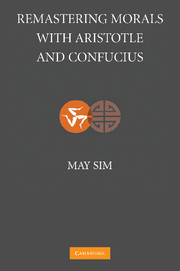Book contents
- Frontmatter
- Contents
- Acknowledgments
- Abbreviations
- Introduction
- 1 Aristotle in the Reconstruction of Confucian Ethics
- 2 Categories and Commensurability in Confucius and Aristotle: A Response to MacIntyre
- 3 Ritual and Realism in Early Chinese Science
- 4 Harmony and the Mean in the Nicomachean Ethics and the Zhongyong
- 5 The Moral Self in Confucius and Aristotle
- 6 Virtue-Oriented Politics: Confucius and Aristotle
- 7 Making Friends with Confucius and Aristotle
- Glossary of Chinese Terms
- Name Index
- Subject Index
5 - The Moral Self in Confucius and Aristotle
Published online by Cambridge University Press: 18 July 2009
- Frontmatter
- Contents
- Acknowledgments
- Abbreviations
- Introduction
- 1 Aristotle in the Reconstruction of Confucian Ethics
- 2 Categories and Commensurability in Confucius and Aristotle: A Response to MacIntyre
- 3 Ritual and Realism in Early Chinese Science
- 4 Harmony and the Mean in the Nicomachean Ethics and the Zhongyong
- 5 The Moral Self in Confucius and Aristotle
- 6 Virtue-Oriented Politics: Confucius and Aristotle
- 7 Making Friends with Confucius and Aristotle
- Glossary of Chinese Terms
- Name Index
- Subject Index
Summary
Both Aristotle and Confucius stress that paradigmatic persons exhibit the nature and content of ethical standards. For that reason, their views of what it is to be a paradigmatic person – and what it is to be a person at all – take on a decisive importance. Conversely, because ethics for both authors centers upon character, getting clear about the self that is formed in character will help clarify the nature of ethics in each case.
One of the starkest differences between Aristotle's and Confucius' views of the self or person is the presence of a soul doctrine in Aristotle and the absence of such a doctrine in Confucius. The soul is the primary substance or form that causes an individual to be the kind of being he or she is. Confucius does not have a soul doctrine; he never speaks of a principle of self that is distinct from, and understood by abstracting from, the body and is the cause of the individual's existence. My purpose is to make three arguments. First, habituation into virtue, social relations, and paradigmatic persons are central for both Aristotle and Confucius. Both therefore need a notion of self supportive of them. Second, Aristotle's individualistic metaphysics cannot account for the thick relations this requires. Third, the Confucian self, if entirely relationistic, cannot function as a locus of choice and agency; if fully ritualistic, cannot function as a source of moral norms that might help assess existing social proprieties.
- Type
- Chapter
- Information
- Remastering Morals with Aristotle and Confucius , pp. 134 - 165Publisher: Cambridge University PressPrint publication year: 2007
- 1
- Cited by

